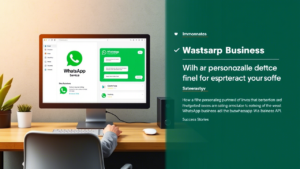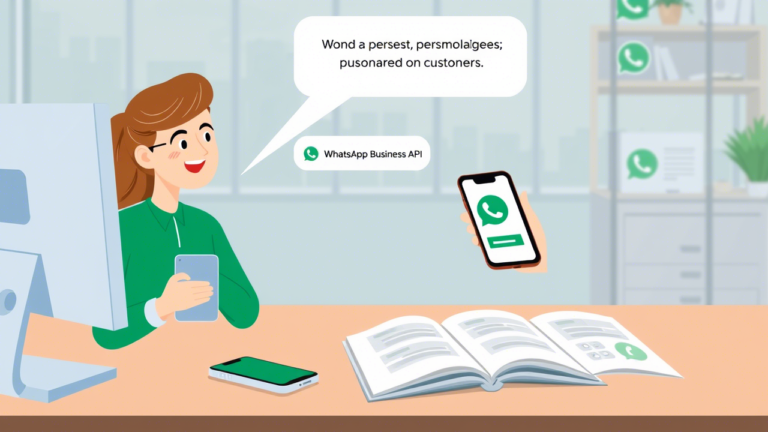In today’s fast-paced digital world, businesses are constantly seeking innovative ways to engage with their customers and provide exceptional service. One of the most effective tools that has emerged in recent years is the WhatsApp Business API. This powerful platform allows companies to deliver personalized service at scale, fostering stronger relationships with their audience while driving customer satisfaction and loyalty. In this article, we will explore how the WhatsApp Business API can revolutionize your customer service strategy, its key features, implementation tips, and real-world use cases that demonstrate its impact.
Understanding the WhatsApp Business API
The WhatsApp Business API is an enterprise-grade solution designed to help businesses communicate with their customers through the popular messaging app, WhatsApp. Unlike the standard WhatsApp Business app, which is tailored for small businesses, the API offers advanced functionalities for medium to large organizations. It enables seamless integration with existing customer relationship management (CRM) systems, chatbots, and other business tools, allowing brands to automate processes, streamline workflows, and deliver highly personalized interactions.
At its core, the WhatsApp Business API empowers businesses to send notifications, respond to inquiries, and share updates in real-time. Whether it’s confirming an order, providing shipping details, or resolving a support ticket, the platform ensures that every interaction feels personal and relevant. By leveraging rich media formats such as text, images, videos, and documents, businesses can create engaging conversations that resonate with their audience. Moreover, the API supports two-way communication, enabling customers to initiate chats and receive timely responses from the brand.
One of the standout advantages of using the WhatsApp Business API is its global reach. With over 2 billion active users worldwide, WhatsApp provides unparalleled access to diverse markets. Businesses can connect with customers across different regions, languages, and demographics without worrying about compatibility issues or additional costs. This makes it an ideal choice for companies looking to expand their footprint and enhance their customer experience on a global scale.

Key Features That Drive Personalization
To truly understand why the WhatsApp Business API excels in delivering personalized service, let’s delve into some of its standout features:
1. Rich Messaging Capabilities
The ability to send multimedia messages sets the WhatsApp Business API apart from traditional communication channels like email or SMS. Brands can use visuals, GIFs, and even interactive buttons to make their messages more appealing and informative. For instance, a fashion retailer could send personalized outfit recommendations based on a customer’s purchase history, complete with high-quality images and direct links to product pages. Such tailored content not only captures attention but also encourages action, leading to higher conversion rates.
2. Automated Workflows and Chatbots
Automation plays a crucial role in scaling personalized services. The WhatsApp Business API integrates seamlessly with AI-powered chatbots, enabling businesses to handle repetitive tasks efficiently. These bots can greet customers, answer frequently asked questions, and guide them through common processes like booking appointments or tracking orders. Importantly, they can be programmed to recognize individual preferences and past interactions, ensuring that each conversation feels unique and meaningful.
3. Customizable Templates
Another game-changing feature is the availability of pre-approved message templates. These templates allow businesses to send structured messages for specific purposes, such as welcome greetings, appointment reminders, or promotional offers. While the templates ensure consistency and compliance with WhatsApp’s policies, they can still be customized to reflect the brand’s tone and style. For example, a travel agency might send a template-based itinerary confirmation that includes the customer’s name, destination, and flight details—all within a single message.
4. Real-Time Notifications
Timely communication is essential for building trust and enhancing the customer experience. The WhatsApp Business API enables businesses to send transactional notifications instantly. Whether it’s a payment receipt, delivery update, or security alert, these messages arrive directly in the customer’s inbox, reducing the likelihood of missed information. Furthermore, since WhatsApp boasts a 98% open rate, businesses can rest assured that their notifications will be seen and acted upon promptly.
Implementation Tips for Success
While the WhatsApp Business API offers immense potential, successful implementation requires careful planning and execution. Here are some practical tips to help you get started:
1. Define Clear Objectives
Before integrating the API, identify what you hope to achieve. Are you aiming to improve response times? Increase sales through targeted campaigns? Or perhaps reduce operational costs by automating routine queries? Having clear goals will guide your strategy and ensure that you maximize the platform’s capabilities.
2. Segment Your Audience
Personalization begins with understanding your audience. Use data analytics to segment your customers based on factors like demographics, behavior, and preferences. This segmentation will enable you to craft tailored messages that address their specific needs and interests.
3. Train Your Team
Even with automation, human intervention remains vital for handling complex queries and maintaining a personal touch. Invest in training your customer service team to use the API effectively and empathetically. Equip them with the skills to interpret customer data and respond appropriately.
4. Monitor Performance Metrics
Track key performance indicators (KPIs) such as response time, resolution rate, and customer satisfaction scores. Regularly reviewing these metrics will help you identify areas for improvement and refine your approach over time.
5. Stay Compliant
WhatsApp enforces strict guidelines regarding message types, frequency, and opt-in requirements. Ensure that your communications comply with these rules to avoid penalties or account suspension. Additionally, prioritize transparency by clearly informing customers about how their data will be used.
Real-World Use Cases
To illustrate the transformative power of the WhatsApp Business API, let’s examine a few real-world examples:
Case Study 1: E-commerce Retailer
A leading e-commerce company implemented the WhatsApp Business API to enhance its post-purchase experience. After placing an order, customers received automated updates on their shipment status, complete with tracking links and estimated delivery dates. If any issues arose, customers could easily reach out via WhatsApp and receive instant assistance from a live agent. As a result, the retailer saw a significant reduction in support tickets and a notable increase in repeat purchases.
Case Study 2: Healthcare Provider
A hospital network adopted the API to streamline patient communication. Patients could book appointments, receive reminders, and access test results directly through WhatsApp. The platform also allowed doctors to share educational materials and follow-up instructions, improving overall care quality. Feedback indicated that patients appreciated the convenience and accessibility of the service, leading to higher engagement levels.
Case Study 3: Financial Institution
A bank leveraged the WhatsApp Business API to offer secure banking services. Customers could check account balances, request loan approvals, and report fraudulent activity—all within the app. The institution further enhanced security by implementing end-to-end encryption and multi-factor authentication. This initiative not only boosted customer confidence but also reduced reliance on call centers.
The Future of Customer Engagement
As consumer expectations continue to evolve, businesses must adapt to stay competitive. The WhatsApp Business API represents a forward-thinking solution that combines technology and human connection to deliver exceptional service. Its emphasis on personalization aligns perfectly with modern trends, where customers value authenticity and relevance above all else.
Looking ahead, advancements in artificial intelligence and machine learning are likely to enhance the API’s capabilities even further. Imagine a future where predictive analytics anticipates customer needs before they arise, or where virtual assistants engage in natural, lifelike conversations. The possibilities are endless, and early adopters stand to gain a significant edge in the marketplace.
Conclusion
Delivering personalized service with the WhatsApp Business API is no longer a luxury—it’s a necessity. By harnessing its robust features, businesses can forge deeper connections with their customers, drive loyalty, and ultimately boost revenue. From automating workflows to sending rich, interactive messages, the platform offers countless opportunities to elevate your customer experience. However, success hinges on thoughtful implementation, ongoing optimization, and a commitment to putting the customer first.
If you’re ready to take your customer service to the next level, consider exploring the WhatsApp Business API. With its unparalleled reach, flexibility, and focus on personalization, it’s a tool that no forward-thinking business should overlook. Embrace this innovative solution today and watch as your brand transforms into a beacon of excellence in customer engagement.
For More Update and Stories Visit: GOLDEN MAGAZINE


